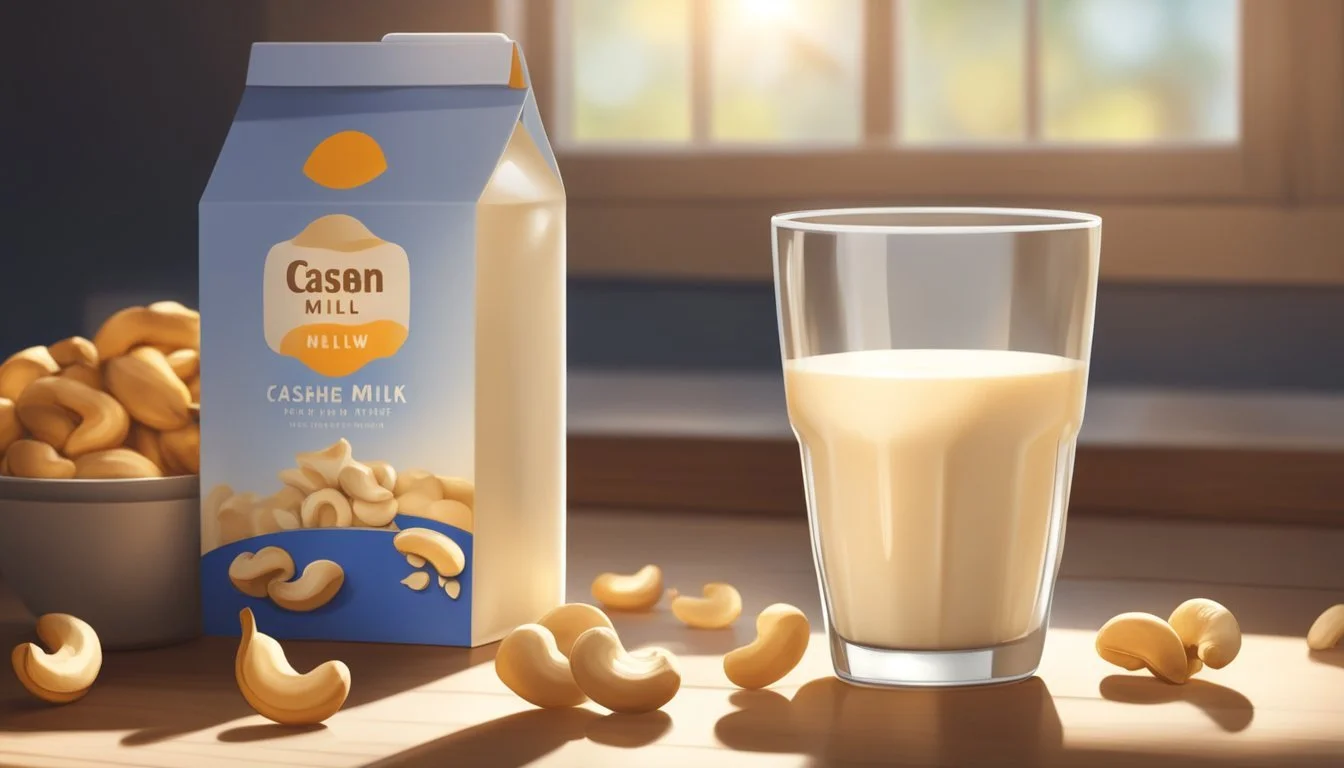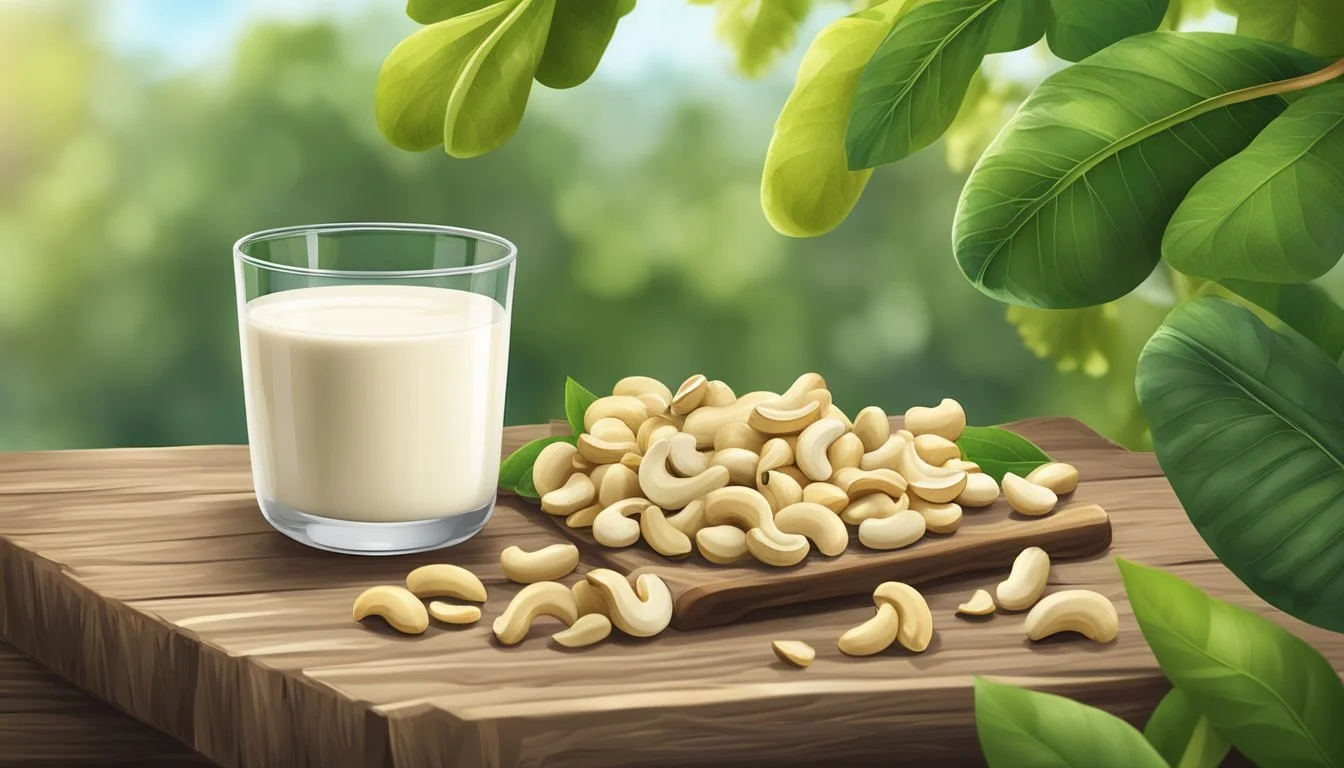Cashew Milk Substitutes
Top Dairy-Free Alternatives Explored
Cashew milk has gained popularity as a plant-based alternative to dairy milk, appreciated for its creamy texture and nutritional benefits. Suitable for vegans and those with lactose intolerance, it fits into a health-conscious lifestyle seamlessly. However, due to allergies or preferences, consumers often seek cashew milk substitutes that align with their dietary needs.
Several milk alternatives offer similar benefits, each bringing its own unique qualities to the table. Almond milk, for instance, stands out as a low-calorie option rich in vitamin E and magnesium, and it's widely used in various culinary applications from lattes to baked goods. Soy milk is another prevalent choice, known for its protein content and as a staple in numerous diets.
Beyond these, an expanding variety of milk alternatives are available, like oat and rice milk, each with distinct nutritional profiles. These alternatives cater to the growing demand for dairy-free options, ensuring that even those with specific dietary restrictions or preferences can enjoy the versatility and taste that milk-like beverages provide.
Nutritional Comparison to Other Milks
When looking at cashew milk compared to other milk alternatives and dairy milk, it is essential to consider protein content, the presence of vitamins and minerals, and the fat and caloric content. Each type of milk offers distinct nutritional profiles that cater to different dietary needs and preferences.
Protein Content in Different Milks
Dairy milk traditionally outperforms most plant-based milks in protein content, with about 7-8 grams of protein per cup. Soy milk stands out among plant-based options as it contains a comparable amount of protein to dairy milk. On the other hand, cashew milk and almond milk typically offer less protein, usually around 2-4 grams per cup. Oat milk has a similar protein content to cashew and almond milk, often slightly higher than almond milk but still lower than soy or dairy milk.
Vitamins and Minerals Present
Plant-based milks are often fortified with vitamins and minerals, particularly calcium and vitamin D, to mimic the nutritional profile of cow’s milk. One finds that both cashew milk and almond milk are rich in vitamin E and commonly fortified. Soy milk and oat milk may also be fortified and typically contain magnesium, zinc, iron, and potassium in varying amounts.
Calcium and Vitamin D
Cow's milk: ~300 mg calcium; often fortified with vitamin D
Fortified plant-based milks: comparable amounts of calcium to cow's milk; often contains added vitamin D
Vitamin E
Almond milk: High in vitamin E
Cashew milk: Also contains vitamin E but typically in smaller amounts than almond milk
Other Minerals
Fortified plant-based milks often contain magnesium, zinc, and iron
Fat and Caloric Content
Cow's milk has varying fat contents depending on whether it's whole, 2%, 1%, or non-fat/skim, with corresponding caloric values. Almond milk tends to have lower calories, mainly when unsweetened, but oat milk often has slightly more calories than almond milk. Cashew milk usually has a moderate calorie count and generally provides unsaturated fats, which are considered heart-healthy. Soy milk also offers a moderate amount of calories with a fat composition mainly consisting of unsaturated fats. All these plant-based milks typically have no cholesterol and low amounts of saturated fat, in contrast to dairy milk which contains cholesterol and higher levels of saturated fat.
Calories and Fats
Skim Cow's milk: Lowest in fat, around 80 calories per cup
Whole Cow's milk: Higher in saturated fat, about 150 calories per cup
Unsweetened Almond milk: Low in calories, usually between 30 to 50 per cup
Oat milk: Slightly more calories than unsweetened almond milk
Cashew milk: Moderate calorie count, lower in saturated fat
Taking a closer look at these milks reveals that each one offers its unique set of nutritional benefits, making them suitable for various diets and health considerations.
Health and Dietary Considerations
When exploring substitutes for cashew milk, one should consider how they cater to lactose intolerance, the balance of omega fatty acids they offer, and potential nut allergies. These factors are crucial for those adhering to specific dietary needs for optimal health.
Lactose Intolerance and Dairy-Free Needs
For individuals who are lactose intolerant, dairy alternatives like cashew milk provide a dairy-free solution that's gentle on the digestive system. These plant-based options are also suitable for vegans and others seeking to exclude dairy from their diets. It's essential to choose fortified alternatives that offer comparable nutrition to dairy milk, including calcium, vitamin B12, vitamin A, and vitamin D.
Balancing Omega Fatty Acids
Cashew milk and its substitutes often contain healthy fats, including omega-3 and omega-6 fatty acids. These fats are crucial for heart health and maintaining a balanced diet. For example, walnut milk is a substitute that not only mirrors the creamy texture of cashew milk but is also a good source of these heart-healthy fats.
Allergies and Nut Sensitivities
While cashew milk is not a common allergen, those with nut allergies or sensitivities must seek alternatives. Options like oat milk are suitable as they are nut-free and provide a rich, creamy taste similar to that of cashew milk. It is crucial to verify that any substitute chosen does not contain allergens that can trigger adverse reactions in sensitive individuals.
Culinary Uses and Cooking Performance
Choosing the right milk substitute can greatly affect the texture, consistency, and flavor of dishes. This section examines how various milk alternatives perform in baking, blending into smoothies and other beverages, and their impact on the overall texture and consistency in cooking.
Baking With Milk Alternatives
When baking, milk alternatives can replace cow's milk on a one-to-one basis. However, almond milk stands out for its slightly sweet and nutty flavor, making it an excellent choice for cakes and cookies. It is important to note when replacing heavy cream or cashew milk, which impart a creamy texture, that almond milk is naturally less rich and may yield a lighter texture in baked goods.
Milk Substitutes in Smoothies and Beverages
For smoothies and beverages, the role of the milk substitute is as much about texture as flavor. Plant-based milks like oat milk and soy milk are preferred for their creamy consistency and neutral taste. They blend well with other ingredients without adding strain to the blender. These milk alternatives do not separate when mixed, maintaining a uniform consistency throughout the smoothie.
Texture and Consistency in Cooking
In cooking, the texture of the milk substitute is key, especially when looking for a creamy texture in sauces and soups. Options like coconut milk can provide the requisite creaminess. Yet, one should consider the subtle coconut flavor it imparts to dishes. For neutral-flavored applications, soy milk is a robust choice as it stands up well to heat and can emulate the mouthfeel of dairy-based recipes without significant flavor alteration.
Popular Cashew Milk Alternatives
Seeking a cashew milk alternative for dietary needs or personal preference? The market offers various non-dairy substitutes, each providing distinct flavors and nutritional benefits.
Almond Milk: The Versatile Favorite
Almond milk stands out as a favored alternative with its mildly nutty flavor and versatile use in recipes. It's a dairy-free option rich in vitamin E, suited for those with lactose intolerance or a vegan diet. Ideal for both sweet and savory dishes, almond milk can effortlessly replace cashew milk in most culinary preparations.
Coconut Milk: Rich and Tropical
Coconut milk, with its rich consistency and tropical taste, is an excellent substitute in smoothies and desserts. Its naturally sweet flavor doesn't overpower, making it a delightful alternative for those enjoying a hint of sweetness without the addition of sugar.
Soy Milk: Protein-Rich Substitute
Soy milk offers a high-protein alternative, making it a nutritional powerhouse among non-dairy milks. With a more robust flavor, it pairs well in coffee and savory recipes, often chosen by individuals seeking to augment their protein intake through plant-based sources.
Oat Milk: Creaminess Without Nuts
Oat milk has emerged for its exceptional creaminess, comparable to cashew milk, without the inclusion of nuts. This makes it a suitable choice for individuals with nut allergies. The mild flavor of oat milk is a canvas for both cooking and baking, enhancing dishes without dominating other ingredients.
Rice Milk: Naturally Sweet Option
Those who prefer a mild and naturally sweet substitute might gravitate towards rice milk. Its thin consistency resembles that of regular milk, making it a fitting nondairy alternative for cereal or beverage sweetening without adding extra sugar.
Considerations for Homemade Substitutes
When creating homemade milk substitutes, it's crucial to focus on the preparation methods and ingredient choices to achieve the desired taste and consistency.
Preparation Techniques for Homemade Milks
Proper blending techniques are at the heart of making smooth, creamy homemade milk substitutes. Blends should be processed until the nuts, seeds, or grains are completely broken down to ensure a smooth texture. Most recipes recommend a high-speed blender for this purpose. Filtered water typically serves as the base for these milks, and it's important to use a quality filter to ensure the water doesn't impart any undesirable flavors. For a creamier taste, one might consider adding a spoonful of coconut cream. When aiming for a creamy texture akin to cow's milk, the ratio of water to solids must be carefully determined; too much water will result in a watery consistency, while too little may make it overly thick.
Ingredient Selection for Desired Flavor Profile
Selecting ingredients thoughtfully is key to achieving a pleasant flavor profile in homemade milk substitutes. Raw cashews are commonly used for their natural creaminess and are often soaked prior to blending to create a smoother milk. To replicate the sweetness found in store-bought or sweetened versions of milk substitutes, add a natural sweetener like honey or sugar. Incorporating vanilla extract or a pinch of salt can enhance the overall flavor.
To cater to personal taste or specific recipes, experiment with the level of sweetness and the addition of other flavorings. Some might prefer a mild, neutral taste to complement coffee or tea, while others might want a richer flavor for smoothies or baking. It's the interplay between the solid contents (like cashews or other nuts) and the additional elements like coconut cream, vanilla, salt, and sugar, balanced with the amount of filtered water used, that ultimately defines the character of the homemade milk substitute.
Environmental and Ethical Factors
When considering the environmental and ethical factors of cashew milk as a plant-based milk substitute, one can appreciate its vegan-friendly profile. Cashew milk is completely plant-based, which means it is produced without the use of animal products or byproducts, aligning with vegan ethics.
Sustainability of Cashew Milk:
Water Usage: Cashew milk production typically requires less water compared to almond milk, making it a more sustainable option.
Emissions: The carbon footprint of growing cashews is lower when compared to nuts like almonds, which are water-intensive.
Ethical Considerations:
Labor Practices: It is important to note that ethical sourcing is crucial, as cashew nut harvesting can be labor-intensive.
Vegan Ethics: Cashew milk meets the standards of vegan ethics by avoiding animal exploitation and contributing less to animal welfare issues.
Environmental Impact Comparison:
Cashew Milk vs Almond Milk: While almond milk has been criticized for its high water usage, cashew milk may pose less of an environmental strain.
Emissions: Cashew milk’s processing and transportation emissions remain an environmental factor to consider, but generally, it has a smaller carbon footprint than dairy milk.
Plant-based milk alternatives like cashew milk offer a sustainable and ethical choice for consumers. These products reduce reliance on animal agriculture and aim to minimize the environmental impact associated with dairy production. However, consumers should consider the entire lifecycle of these products, including the ethical implications of sourcing and the complexities of their environmental footprints. It's vital for consumers to choose brands that strive for ethical practices in their production and sourcing methods.
Global Perspectives on Milk Alternatives
Milk alternatives are rapidly gaining popularity across the globe as consumers seek out dairy-free options for health, ethical, and environmental reasons. Among these alternatives, cashew milk has emerged as a creamy, rich substitute that aligns with many global cuisines.
In India, cashew milk, along with other plant-based milk substitutes, is intertwined with traditional practices and lactose intolerance considerations. It's becoming an integral part of the varied Indian dietary landscape known for its rich spices and vegetarian focus.
Dairy-free alternatives are gaining traction around the world due to their versatile applications in culinary arts. With their ability to adapt to various flavor profiles, milk substitutes like almond, soy, and rice milks complement global cuisine, offering new textures and tastes.
Plant-based milk options vary considerably in their nutritional content:
Soy milk: High in protein, often chosen for its closer semblance to cow's milk in nutrition.
Almond milk: Low in calories, but typically lower in protein unless fortified.
Rice milk: Often sweet with a thin consistency, low in protein and fat.
Substitutes for cashew milk include the above-mentioned alternatives as well as oat milk, which has gained popularity for its environmental benefits and creamy consistency. Each alternative offers a unique profile that caters to different dietary needs and preferences.
The dialogue surrounding these alternatives is complex and multifaceted, with consumers weighing taste, nutritional value, cultural considerations, and environmental impact. As the demand grows, so does the innovation within the market, leading to an ever-expanding array of choices for the conscious consumer.






